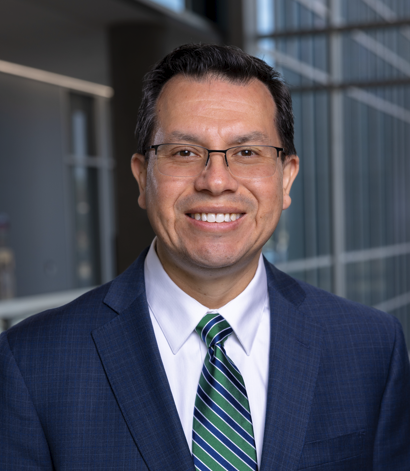
AI in Medical Education: Faculty as Learners and Educators - May 22
-
Register
- User - Free!
Utilization of AI in the classroom hinges on knowledgeable faculty and staff. This webinar focuses on the important role and practical implementation of faculty development around essential understandings of emergent AI’s tools and capabilities in this rapidly changing environment. Panelists will share practical examples of how they are educating faculty about institutional decisions related to the incorporation of AI, ensuring they are well-informed and equipped to utilize AI tools, and guide learners and patients effectively in this evolving educational and clinical environment.

Nathan M. Cross, MD, MS, CIIP, DABR
Associate Professor, Neuroradiology
Vice Chair of Informatics
University of Washington

Diego Niño, MD, PhD
Associate Professor of Physiology
Department of Medical Education
University of Texas at Tyler School of Medicine
Diego F. Niño, MD, PhD is an Associate Professor of Physiology in the Department of Medical Education at The University of Texas at Tyler School of Medicine in Tyler, TX. In addition to his faculty role, he serves on the USMLE Physiology and Cell Biology Test Material Development Committee for the National Board of Medical Examiners (NBME). Dr. Niño is a scholar and faculty of the Harvard Macy Institute Transforming your Teaching using Technology Course and a founding member of the International Association of Medical Science Educators (IAMSE) Artificial Intelligence subcommittee. His academic and research interests are focused on developing and implementing innovative strategies to deliver technology-enhanced educational experiences within the medical education curriculum. He focuses on advancing medical education through implementing active learning strategies, creating interactive tools that enhance student learning, incorporating educational technology and artificial intelligence.

Akshay Sood, MD, MPH
Assistant Dean, Mentoring and Faculty Retention
Interim Director, Faculty Academic Affairs
University of New Mexico School of Medicine
Akshay Sood, the interim Director of Faculty Affairs at the UNM HSC, is a tenured Distinguished Professor, Regents Professor, and the founding Miners’ Colfax Medical Center Endowed Chair at the University of New Mexico’s School of Medicine. Dr. Sood received his postdoctoral fellowship in Pulmonary, Critical Care, and Occupational and Environmental Medicine at Yale University, New Haven, Connecticut.
Passionate about the role of mentoring junior faculty, he leads the UNM HSC Faculty Mentor Development Program which has been adopted by 13 institutions across seven states. He is the Assistant Dean of Mentoring and Faculty Retention at the UNM School of Medicine Office of Faculty Affairs and Career Development and past Associate Director of the Mentoring Core of the Mountain West-CTR-IN Professional Development Core. He is a national expert on faculty development and retention, with presentations at the UNM Mentoring Conference/AAMC. His current research interest is on the assessment of the institutional mentoring climate, strategies to improve underrepresented faculty retention, and innovative mentor development initiatives. He is the P.I. of a multi-institutional U01 grant on the “Effectiveness of Innovative Research Mentor Interventions among Underrepresented Minority Faculty in the Southwest (NIGMS U01GM132175-01)”.

Eric Weissman
Senior Director, Faculty and Academic Society Engagement
AAMC
Eric serves as senior director of faculty and academic society engagement for the Washington-based Association of American Medical Colleges (AAMC). In this role, Eric manages the day-to-day operations of the Council of Faculty and Academic Societies, or CFAS, one of the AAMC’s three governing bodies. CFAS represents the interests of medical school faculty and academic societies within the AAMC’s membership. Among key issues covered are faculty wellbeing and resilience, sexual and gender harassment, diversity in academic medicine, advancement of science and research within academic medicine, graduate medical education, faculty definition and identity, and the role and impact of medical school faculty within clinical, research, and educational settings.
Eric is also the principal writer and editor of the weekly “CFAS News” publication, which goes to more than 5,000 subscribers representing leaders in academic medicine, media, health policy.
Eric previously served for a decade as senior director of publishing services in the Communication cluster at the AAMC, overseeing the AAMC website, its creative and editorial services division, and its publishing efforts. Eric additionally has a long history in science and medical communications, having held an array of leadership positions at organizations such as Stanford School of Medicine, Veterinary Centers of America, WebMD, and other organizations focused on consumer health, medicine, and science. Eric also has worked as a writer and editor for Congressional Quarterly and Time Life Books.

Jinjie Zheng, PhD, MS, MA
Assistant Dean, Digital Technology
Morehouse School of Medicine
Dr. Jinjie Zheng is an Associate Professor in the Department of Medical Education and serves as the Assistant Dean for Digital Technology at Morehouse School of Medicine. She is dedicated to advancing health equity through digital learning and has been pivotal in creating innovative and effective digital learning solutions for both students and faculty. Dr. Zheng's research interests include educational technology in academic medicine, digital dissemination of health equity, and the development of medical faculty technology. Currently, she is leading the Digital Health Educator initiative at the institution, funded by the National Telecommunications and Information Administration (NTIA).
